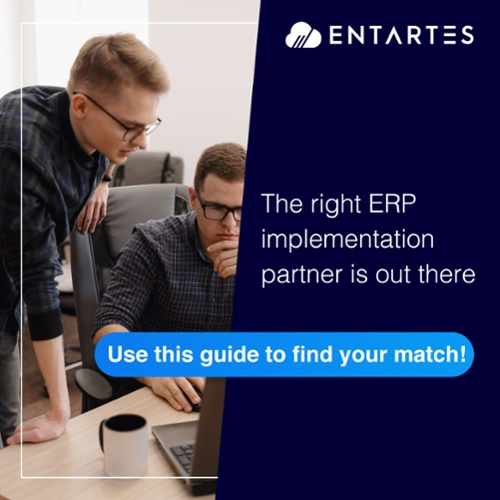It comes as no surprise that companies function differently based on their size. This is no...
What Is An ERP Software Partner?
So, you’ve decided to make the leap and invest in an Enterprise Resource Planning (ERP) software system to help your business grow — congrats! Now that the first step is out of the way, what's next?
The road from this point to getting your ERP system running smooth and efficient can seem quite intimidating — be it budget constraints, time, fear of lost data/information, etc. It’s critical to understand your options when implementing your ERP and ensure you’re making the right decisions to maximize your investment.
That includes looking into the possibility of working with a partner.
ERP software partners, also known as consultants, can help simplify this process and work with your company to craft an ERP solution that’s built specifically for you. Let’s take a look at what they are and how they can help your ERP deployment.
What Exactly Is An ERP Partner/Consultant?
ERP partners are licensed, third-party vendors that sell ERP software and/or provide services that you won’t necessarily find in your packages that come straight from your ERP software vendor or original manufacturer.
Whether that be helping search for the right ERP software, the implementation itself, and/or customer support, these partners work with your company in a way that can’t be done by just any ERP vendor.
These teams are often full of experts in the field who have implemented thousands of ERP solutions and have many years of experience. Although partners are often well rounded and offer a vast majority of solutions, some have backgrounds in specific industries and software that can prove beneficial to your company.
How Can A Partner Help My Company?
With an ERP being one of the core software systems that your company runs on, there’s very little room for error. Without the help from a partner or consultant, you could face tough road blocks such as data loss, exceeding your budget, lost time, and even failure to deploy.
Regardless of your company size, you can benefit from working with an ERP partner. Partners will understand how ERPs work in your industry and the current best practices/workarounds to create an efficient, customized ERP system that works for your business. With an investment of this nature, your company deserves:
-
A dedicated team of experts that is ready to maximize your ROI at any moment.
-
Deploy the most efficient ERP software system possible.
-
Address any concerns that arise in the process.
Even for companies who have already deployed an ERP system, partners have the opportunity to step in and optimize their system to ensure there aren’t any workarounds, issues hiding under the surface, and to maximize the total cost of ownership.
What Should You Look For In A Partner?
Now that you’re a bit more familiar with ERP partners, what should you be looking for when searching who to work with? Here’s are some factors to help you decide:
1. Software Experience
If you’ve searched for ERP software before, you’re probably familiar with the vast majority of ERP software available. If not, get ready for some research because the options are plentiful. If you’ve already decided on a specific software, make sure to select a partner that has a proven track record with that software and other integrations.
2. Industry Experience
Just as you need someone with the specific software experience that you want to use, you should be searching for a partner with experience in the specific industry your business operates in. When a partner has years of experience working with a specific industry, they already know the ins and outs of business practices, industry trends, and most importantly, specific customizations that can make your ERP more efficient and cost effective.
3. Support
Customer support is one of the main reasons why companies look to implement their ERP systems with a partner. Although you can purchase your ERP software directly from a vendor, businesses often find themselves looking for more dedicated help during the deployment process that isn’t always available from the vendor. Partners work side by side with your team to ensure a timely, cost-effective and successful deployment while often offering a dedicated support contact(s).
4. References
You should take into consideration the references and word of mouth from your peers, previous clients, and companies that the partners have worked for. You are placing a lot of responsibility and trust into these partners for your ERP to be as efficient as possible and it can be quite daunting. The references and success stories from credible sources can help ease this and feel secure if your decision to launch your ERP with a partner rather than through the vendor.5. Location
The location of your partner is a factor that could make or break your decision. As the trend of working remotely has gained credibility and more companies are seeing a less strict policy regarding working in the office, you may not need those face-to-face meetings with your ERP partner. However, you could value creating that relationship with your partner and need to find one based in the same area as you. Discuss with your team and prospective partners to find out which setting works best.
When it comes time for your company to implement an ERP system, you should not underestimate the importance of working with a partner. This could be a make-or-break decision resulting in either a successful or unsuccessful deployment.
4 Key Takeaways From This Blog
-
An ERP partner/consultant is a team of experts you rely on to get the most out of your ERP software.
-
Partners often know what's best for your specific industry through years of implementations within the same field.
-
Partners can reduce the risk of costly errors and even failure in your ERP deployment
-
ERP partners are valuable at any point in the ERP implementation process — even if you’ve already implemented a system.






Blog Comments